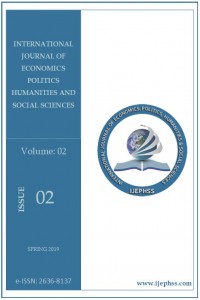Öz
Ülkelerin sosyo-ekonomik performanslarını değerlendirmek
için yaygın olarak kullanılan insani gelişim indeksleri, gelişmenin hangi
oranda eko-kapasite ve çevresel etki kullanılarak gerçekleştirildiğini göz ardı
etmektedir. Oysa sürdürülebilir kalkınmanın evrensel tanımına göre, sadece
İnsani Gelişme İndeksi (İGİ) parametrelerinin kullanımı sürdürülebilirlik için
bir çelişkidir. İGİ'nin ülkelerin çevresel etkisinin temel kriteri olan
ekolojik ayakizi (EA) parametreleri ile birlikte kullanılması sürdürülebilirlik
için çok daha önemli bir göstergedir. Bu çalışmanın amacı, altı Türk
Devleti'nin insani gelişimin ne derecede sürdürülebilir (sosyo-ekolojik)
gelişmeye (E-SHDI) bağlı olduğunu belirlemektir.
Anahtar Kelimeler
Ekolojik Ekonomi Ekolojik Ayakizi İnsani Gelişmişlik İndeksi Sürdürülebilir Kalkınma
Kaynakça
- Adler, N., Yazhemsky, E., Tarverdyan, R., A., (2010), “Framework to Measure the Relative Socio-Economic Performance of Developing Countries”, Socioecon Plann Sci. 44(2): ss.73–88.
- Barrera, R.A. ve Saldívar, V.A., (2002), “Proposal and Application of A Sustainable Development Index”, Ecol Indic., 2:251–256.
- Boyd, J. Ve Banzhaf, S., (2007), “What Are Ecosystem Services? The Need for Standardized Environmental Accounting Units”, Ecol Econ. 63(2–3): ss.616–626.
- Costanza, R., (2000), “Social goals and the valuation of ecosystem services”, Ecosystem, 3:4–10.
- Costanza, R., Fisher, B, Ali S., Beer,C., Bond, L., Boumans, R., Danigelis. N.L., Dickinson, J., Elliott, C., Farley, J., Gayer, D.E., Glenn, L.M., Hudspeth, T., Mahoney, D., McCahill, L., McIntosh, B., Reed, B., Rizvi, S.A.T., Rizzo, D.M., Simpatico T., Snapp R. (2007),” Quality of life: An approach integrating opportunities, human needs, and subjective well-being”, Ecological Economics, 61:2-3, 267-276.
- Costanza, R., Hart, M., Posner, S., Talberth, J., (2009), Beyond GDP: The Need for New Measures of Progress, The Pardee Papers, No. 4., ss.34.
- Dasgupta, P. ve Weale, M., (1992), “Measuring Quality of Life”, World Dev. 20(1): ss.119–131.
- Despotis, D,K., (2005), “Measuring via Human Development Data Envelopment Analysis: The Case of Asia and the Pacific”, Omega. 33(5):ss.385–390.
- Ewing, B., Reed, A., Galli, A., Kitzes, J., Wackernagel, M., (2010), Calculation Methodology for the National Footprint Accounts, Oakland (CA): Global Footprint Network, ss.21.
- Fisher, B., Turner, R.K., Morling, P., (2009), “Defining and Classifying Ecosystem Services for Decision Making”, Ecol Econ.68(3): ss.643–653.
- Gidwitz, Z., Heger, M.P., Pineda, J., Rodríguez, F., (2010), Understanding Performance in Human Development: A Cross-National Study. Human Development Research Papers Office. New York (NY): UNDP, ss. 45.
- Koroneos, C.J. Ve Rokos, D., (2012), “Sustainable and Integrated Development – A Critical Analysis”, Sustainability, 4 (1): Ss.141–153.
- Mazumdar, K., (2003), “A New Approach To Human Development İndex”, Rev Soc Econ. 61(4): ss.535–549.
- Moran, D.D., Wackernagel, M., Kitzes, J.A., Goldfinger, S.H., Boutaud, A., (2008), “Measuring Sustainable Development – Nation by Nation”, Ecol Econ. 64: ss.470–474.
- Morse, S., (2003b), “For Better or for Worse, Till the Human Development Index Dous Part?”, Ecol Econ., 45: ss.281–296.
- Morse, S.,( 2003a), “Greening the United Nations’ Human Development Index?”, Sustain Dev. 11: ss.183–198.
- Mostafa, M.M., (2010), “A Bayesian Approach to Analyzing the Ecological Footprint of 140 Nations”, Ecol Indic. 10: ss.808–817.
- Neumayer, E., (2001), “The Human Development Index and Sustainability – A Constructive Proposal” Ecol Econ., 39: ss.101–104.
- Noorbaksa, F., (1998), “A Modified Human Development Index”, World Dev. 26(3): ss.517–528.
- Ogwang, T., (2000) “Inter-Country Inequality in Human Development Indicators”, Appl Econ Let. 7:ss.443–446.
- Özler¸ S.I. Ve Obach, B.K., (2009), “Capitalism, State Economic Policy and Ecological Footprint”, Global Environ Polit. 9(1): ss.79–108.
- Princen, T., (2008), “Notes on the theorizing of global environmental politics”, Glob Environ Polit. 8(1): ss.1–5.
- Ranis, G., Stewart. F., Samman, E., (2006), Human development: beyond the human development index. J Hum Dev Capabilities. 7(3): ss.323–358.
- Sagar, A.D., Najam, A., (1998), “The Human Development Index: A Critical Review”, Ecol Econ. 25(3): ss.249–264.
- Siche, J.R., Agostinho. F., Ortega, E., Romeiro, A., (2008), “Sustainability of Nations by İndices: Comparative Study between Environmental Sustainability Index, Ecological Footprint and the Energy Performance Indices”, Ecol Econ. 66:628–637.
- Spangenberg JH, Fuad-Luke A, Blincoe K. 2010. Design for sustainability (DfS): the interface of sustainable production and consumption. J Clean Prod. 18:1485–1493.
- Stiglitz JE, Squire L. 1998. International development: is it possible? Foreign Policy. 110:138–151.
- Türe, C. ve Böcük, H., (2008), “Investigation of Threatened Arable Weeds and Their Conservation Status in Turkey” Weed Res. (Int Jweed Biol Ecol Veg Manage), 48(3): ss.289–296.
- Türe, C., ( 2013), “A Methodology to Analyse the Relations of Ecological Footprint Corresponding with Human Development Index: Eco-Sustainable Human Development Index”, International Journal Of Sustainable Development & World Ecology, 20:(1), ss. 9-19.
- Ul-Haq, M., (1996), Reflections On Human Development. Oxford (UK): Oxford University Press. ss. 288.
- Wackernagel, M. Ve Rees, W.E., (1997), “Perceptual and Structural Barriers to İnvesting in Natural Capital: Economics from an Ecological Footprint Perspective” , Ecol Econ. 20: Ss.3–24.
- Wackernagel, M., Monfreda, C., Moran, D.,Wermer, P., Goldfingeri S., Deumling, D., (2005), National Footprint and Biocapacity Accounts 2005: The Underlying Calculation Method. Oakland, CA, USA,)”,Global Footprint Network,ss.33.
- Wiedmann T, Barrett J. 2010. A review of the ecological footprint indicator – perceptions and methods. Sustainability. 2:1645–1693.
- Ziegler, Z.R., (2007), “Political perception and ensemble of macro objectives and measures: the paradox of the index for sustainable economic welfare”, Environ Values, 16: ss.43–60.
Ayrıntılar
| Birincil Dil | Türkçe |
|---|---|
| Bölüm | Makaleler |
| Yazarlar | |
| Yayımlanma Tarihi | 15 Nisan 2019 |
| Yayımlandığı Sayı | Yıl 2019 Cilt: 2 Sayı: 2 |
International Journal of Economics, Politics, Humanities & Social Sciences – IJEPHSS Creative Commons Atıf-GayriTicari 4.0 Uluslararası Lisansı (CC BY NC) ile lisanslanmıştır.


